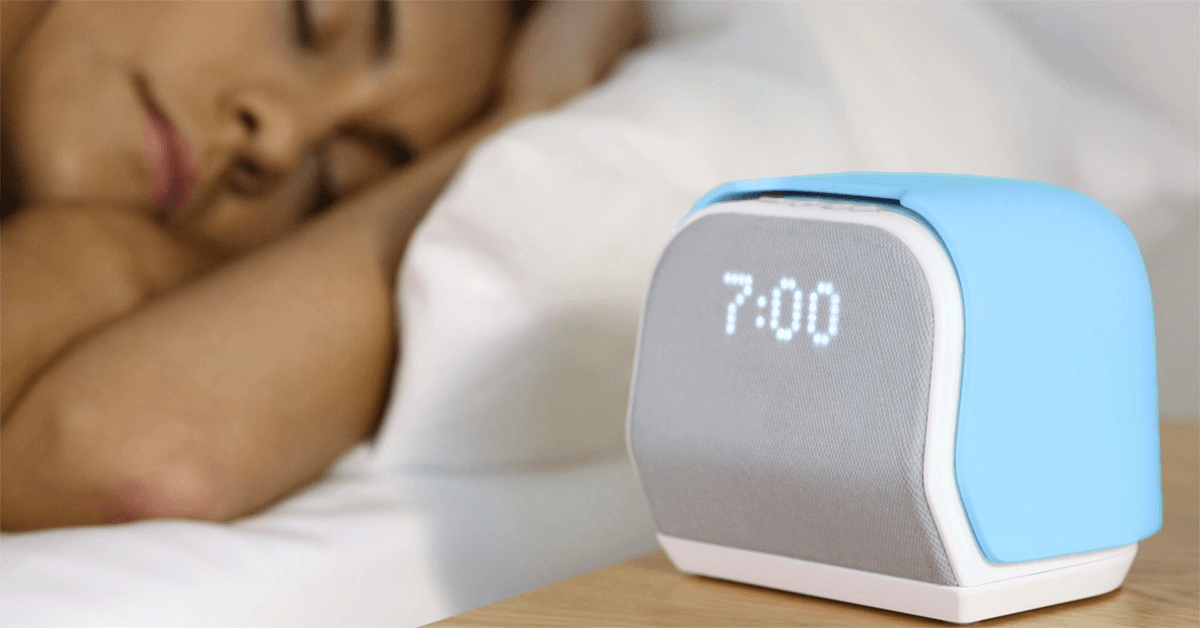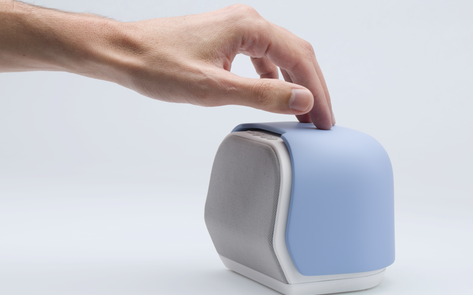
Photo credit: Kello.
Using your phone as an alarm clock might be the easiest way to wake up in the morning, but a screen in the bedroom is generally a bad idea when it comes to sleep quality.
“A lot of people […] are realizing that it’s time to get rid of our phones, especially in the bedroom,” says Antoine Markarian, the CEO and co-founder of Kello, a Hong Kong-based hardware startup. “It’s time to liberate [ourselves] from our phones.”
Antoine knows a thing or two about struggling with sleep. Before he co-founded Kello, Antoine experimented with various sleep regimens, tracking his results in an Excel spreadsheet. He tried regular and irregular sleep schedules, and even tinkered with different amounts of caffeine before bed.
“I realized it was a lifestyle issue,” says Antoine. “It was not an issue you could solve with pills […] or more sensors inside your bed.”
Last April, Antoine began dedicating himself full-time to solving the sleep problem by co-founding Kello with his brother, Greg Markarian, and Fred Germain, Antoine’s old coworker from Deezer, a music streaming company headquartered in France. The company’s goal is simple: help people enjoy their mornings again by improving how they sleep.
“We want to build devices and services that will help people sleep,” says Antoine. “We want to see ourselves as a replacement for sleeping pills.”
Baby steps

Photo credit: Kello
In many ways, Kello’s eponymous alarm clock is about getting back to the basics: no phone, no snoozing, no Netflix before bed. To get there, Kello offers users a variety of programs aimed at changing your sleep habits incrementally. For example, if you want to wake up an hour earlier, Kello will set your alarm a few minutes earlier everyday so by the time one month goes by, you’ll have achieved your goal.
Likewise, if you have plans to travel to a different time zone, Kello can help you offset the jet lag by gradually tweaking your body’s internal clock or circadian rhythm. A companion app, which is used for setting up different sleep programs, is used input your current and future time zone, and the alarm clock will compute the sleep program accordingly.
“Let’s say I feel a little bit tired, so I’m going to be snoozing,” says Antoine. “We allocate a number of snooze per week, […] if you go above your quota, the alarm clock will change its behavior.”
Users can set their own “snooze allowance” and corresponding penalties for going over it, like playing an annoying alarm or having to click Kello’s off button twice instead of once to shut off the alarm. Nothing extreme – just small inconveniences that will hopefully nudge people away from snoozing.
Keep it simple, keep it physical
On top of the sleep programs and the snooze quota, Kello’s alarm clock comes with all the trimmings of an IoT product. It’s compatible with other smart home devices like Samsung’s SmartThings Hub and Philips’ Hue. It can automate morning rituals, such as brewing coffee or closing your blinds. The alarm clock can also stream music from services like Spotify and Deezer so you can wake up to your favorite tunes.
Still, one of Kello’s greatest competitive advantages is simply that it’s a physical object.
“Building a device is the best way,” says Antoine. “It’s a physical reminder […] rather than an app that you have on your phone.”
“Kello work[s] without your phone,” he adds. “So you can ban your phone from the bedroom.”
Photo credit: Kello.
Forming habits is hard
None of this is rocket science – most of Kello’s features are based on well-documented research – but the challenge will be getting users to actually change their lifestyle. In particular, many factors that affect sleep quality, such as exercise and caffeine intake, fall outside of Kello’s scope.
“Obviously, […] Kello is not gonna help you not drink coffee at 10pm,” says Antoine. “So we chose to really focus on the body clock.”
In addition, for those who travel often, Kello might not be a suitable choice as it’s not as portable as your phone. However, in the future, the company plans on rolling out other sleep-related devices, some of which are already in the startup’s product pipeline.
Kello launched on Kickstarter at 8PM EST today, starting at US$89 with a crowdfunding goal of US$50,000.
This post This smart alarm clock wants to turn you into a morning person appeared first on Tech in Asia.
from Tech in Asia https://www.techinasia.com/kello-smart-alarm-clock
via IFTTT
No comments:
Post a Comment